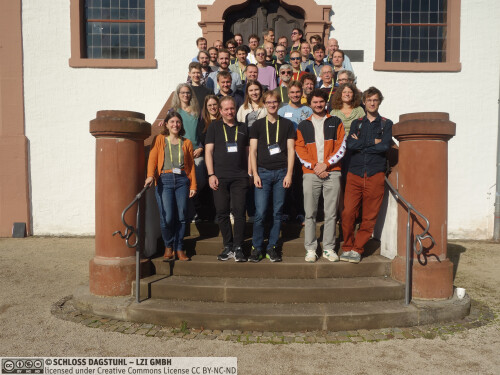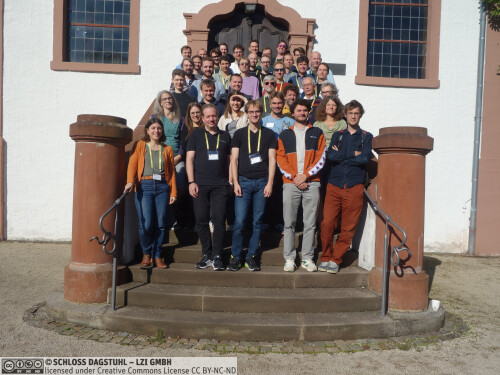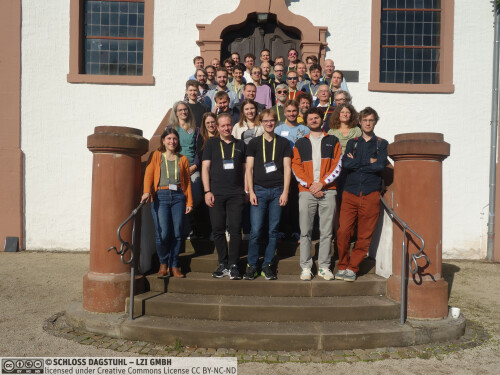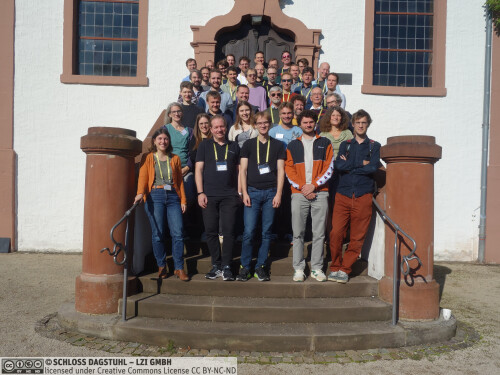Dagstuhl-Seminar 25401
Societal Impact of Computational Social Choice
( 28. Sep – 02. Oct, 2025 )
Permalink
Organisatoren
- Martin Lackner (TU Wien, AT)
- Nicholas Mattei (Tulane University - New Orleans, US)
- Arianna Novaro (Université Paris 1 Panthéon-Sorbonne, FR)
- Clemens Puppe (KIT - Karlsruher Institut für Technologie, DE)
Kontakt
- Marsha Kleinbauer (für wissenschaftliche Fragen)
- Simone Schilke (für administrative Fragen)
Dagstuhl Reports
As part of the mandatory documentation, participants are asked to submit their talk abstracts, working group results, etc. for publication in our series Dagstuhl Reports via the Dagstuhl Reports Submission System.
- Upload (Use personal credentials as created in DOOR to log in)
Dagstuhl Seminar Wiki
- Dagstuhl Seminar Wiki (Use personal credentials as created in DOOR to log in)
Gemeinsame Dokumente
- Dagstuhl Materials Page (Use personal credentials as created in DOOR to log in)
Computational Social Choice (COMSOC) is an interdisciplinary field between classical social choice theory in economics and theoretical computer science. The focus is to study algorithms for collective decision-making problems, such as political elections, the allocation of resources, and so on.
In this Dagstuhl Seminar, we want to focus on three main topics. The first one is data, which has become an essential element for COMSOC research. In fact, thanks to the availability of open libraries, datasets and tools, researchers can now implement and test their algorithms for collective decision-making on real-life data, complementing their theoretical results. The second one is participation, as in recent years many municipalities and public institutions have moved towards various forms of participatory and digital democracy, with the goal of increasing the citizens' active role and engagement in the public life of their communities. The third one is time, as although many collective decision-making problems have an underlying repeated nature, this dimension has thus far not received the deserved attention within standard COMSOC models.
Moreover, we aim to address these topics under the two overarching themes of domain restrictions and societal impact: while domain restrictions can be seen as a methodological question over the input of our problems, societal impact can be seen as part of their output, i.e., the applications originating from theoretical research.
 Martin Lackner, Nicholas Mattei, Arianna Novaro, and Clemens Puppe
Martin Lackner, Nicholas Mattei, Arianna Novaro, and Clemens Puppe
Please log in to DOOR to see more details.
- Dorothea Baumeister (HS Bund f. Öffentl. Verwaltung - Brühl, DE) [dblp]
- Gerdus Benade (Boston University, US) [dblp]
- Ratip Emin Berker (Carnegie Mellon University - Pittsburgh, US)
- Niclas Boehmer (Hasso-Plattner-Institut, Universität Potsdam, DE) [dblp]
- Sylvain Bouveret (University of Grenoble, FR) [dblp]
- Florian Brandl (Universität Bonn, DE) [dblp]
- Felix Brandt (TU München - Garching, DE) [dblp]
- Robert Bredereck (TU Clausthal, DE) [dblp]
- Markus Brill (University of Warwick - Coventry, GB) [dblp]
- Martin Bullinger (University of Oxford, GB) [dblp]
- Andreas Darmann (Universität Graz, AT) [dblp]
- Théo Delemazure (University of Amsterdam, NL)
- Edith Elkind (Northwestern University - Evanston, US) [dblp]
- Ulle Endriss (University of Amsterdam, NL) [dblp]
- Piotr Faliszewski (AGH University of Science & Technology - Krakow, PL) [dblp]
- Paul Gölz (Cornell University - Ithaca, US) [dblp]
- Umberto Grandi (University Toulouse Capitole, FR) [dblp]
- Davide Grossi (University of Groningen, NL) [dblp]
- Mathijs Kemp (Vennster - Almere, NL)
- Sonja Kraiczy (University of Oxford, GB)
- Martin Lackner (TU Wien, AT) [dblp]
- Jérôme Lang (CNRS - Paris, FR) [dblp]
- Patrick Lederer (UNSW - Sydney, AU) [dblp]
- Jan Maly (Wirtschaftsuniversität Wien, AT)
- Nicholas Mattei (Tulane University - New Orleans, US) [dblp]
- Nicolas Maudet (Sorbonne University - Paris, FR) [dblp]
- Reshef Meir (Technion - Haifa, IL) [dblp]
- Oliviero Nardi (TU Wien, AT) [dblp]
- Arianna Novaro (Université Paris 1 Panthéon-Sorbonne, FR) [dblp]
- Dominik Peters (University Paris-Dauphine, FR) [dblp]
- Jannik Peters (National University of Singapore, SG) [dblp]
- Marcus Pivato (Université Paris 1 Panthéon-Sorbonne) [dblp]
- Friedrich Pukelsheim (Universität Augsburg, DE) [dblp]
- Clemens Puppe (KIT - Karlsruher Institut für Technologie, DE) [dblp]
- Ulrike Schmidt-Kraepelin (TU Eindhoven, NL) [dblp]
- Piotr Skowron (University of Warsaw, PL) [dblp]
- Arkadii Slinko (University of Auckland, NZ) [dblp]
- Stanislaw Szufa (CNRS - Paris, FR) [dblp]
- Frederik Van De Putte (Erasmus University - Rotterdam, NL) [dblp]
- Toby Walsh (UNSW - Sydney, AU) [dblp]
- Tomasz Was (University of Oxford, GB)
Klassifikation
- Computer Science and Game Theory
- Multiagent Systems
Schlagworte
- computational social choice
- data
- time
- participation





 Creative Commons BY 4.0
Creative Commons BY 4.0
